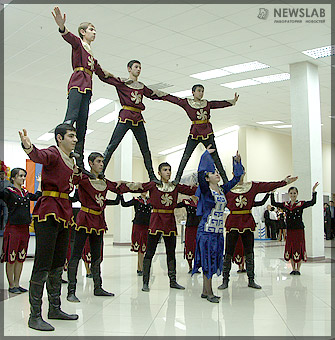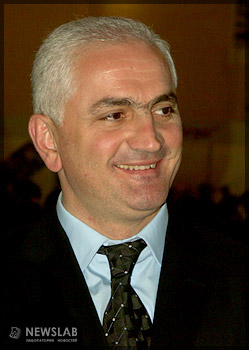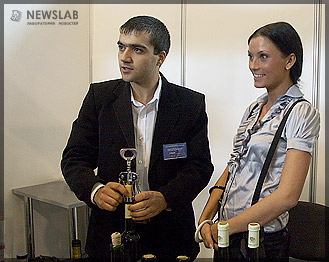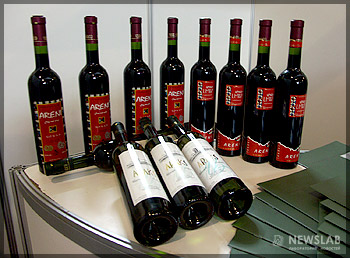Re: The Rise of the Russian Empire: Russo-Armenian Relations

Armenia distanced itself Thursday from the latest upsurge in Russian-Georgian tensions that has been triggered by the arrest of a group of Russian military officers for alleged spying which Georgia says was coordinated by Russian intelligence agents in Yerevan.
Georgian authorities said on Wednesday that they detained four GRU (Russian military intelligence) officers as well as 11 Georgian citizens suspected of involvement in an alleged Russian plot against the pro-Western government in Tbilisi. Georgian Interior Minister Vano Merabishvili said they “acted under the leadership from Yerevan” of a top GRU officer whom he identified as Anatoly Sinitsyn. Moscow angrily rejected the accusations, demanding an immediate release of its citizens. Reuters reported that Defense Minister Sergei Ivanov denounced as a "complete outrage" Georgia's action which he said had also included the beating of a Russian officer and six soldiers in a separate incident in the Black Sea port of Batumi.
Officials in Yerevan insisted that Armenia, Russia’s main regional ally, bears no responsibility for the acrimonious scandal. “We have nothing to do with that,” the Armenian Foreign Ministry spokesman, Vladimir Karapetian, told RFE/RL. Colonel-General Mikael, the Armenian chief of staff, echoed the statement, urging journalists not to “jump into conclusions.” He also dismissed as irrelevant the fact that four of the arrested Georgian nationals are reportedly ethnic Armenians.
“They are citizens of Georgia, and I think authorities in Georgia will clear things up,” said Harutiunian. “I think we will be able to say something concrete about this issue after finally understanding what the matter is. It is too premature to comment now.” Asked about the Georgian claims that the alleged Russian espionage was guided from Armenian territory, Harutiunian replied: “They can say anything. What they say is their business. But there has to be evidence.”
Other Armenian officials argued that Yerevan has no control over the happenings inside Russia’s diplomatic missions and military base in Armenia. None of the diplomats at Russian embassy in Yerevan that bears the name Anatoly Sinitsyn, an embassy spokeswoman told RFE/RL. Merabishvili would not say if Tbilisi will raise the issue with Yerevan, and the Georgian embassy in Armenia declined a comment. According to Karapetian, the Armenian government has received no diplomatic notes or other messages from the Georgian side in connection with the affair.
Link: http://www.armenialiberty.org/armeni...3005DE4FC7.ASP
TBILISI, Georgia — Russia recalled its ambassador to Georgia on Thursday and warned that it would use "all means available to us" to secure the release of Russian military-intelligence officers arrested here Wednesday on charges of espionage. In New York, Russian diplomats called for emergency consultations by the U.N. Security Council. Georgian police continued to surround Russian military headquarters in central Tbilisi, the Georgian capital, demanding that the Russians turn over another officer who they say is also implicated in spying and is in hiding in the complex. Russia has maintained a military presence in Georgia, its southern neighbor, since the fall of the Soviet Union, although all its troops are scheduled to be withdrawn by 2008.
Relations between the two countries have been marked by mutual loathing since President Mikheil Saakashvili came to power here in January 2004 and declared his intention to take Georgia, a former Soviet republic, out of Russia's orbit and into the NATO alliance. Georgia also accuses Russia of supporting two breakaway regions that are inside the country's internationally recognized borders but have been effectively independent since short wars in the early 1990s.
On Wednesday, Georgian officials announced that they had arrested four Russian officers, three lieutenant colonels and a major, accusing them of attempting to gather classified information on Georgia's cooperation with NATO and on some of its military deployments. The Interior Ministry here said Thursday that it had detained another two Russian servicemen on suspicion of espionage.
"The charges that have been brought against them are moronic and absolutely far-fetched," said Russian Defense Minister Sergei Ivanov, visibly angry as he spoke on Russian television Thursday.
Russia's foreign minister, Sergei Lavrov said his government would achieve the men's release "with all the means available to us," according to RIA Novosti news agency. The Interfax agency said he called the arrests "the latest example of an anti-Russian policy."
Georgian officials continued to insist that they had audio and video evidence of the Russians' involvement in espionage. Georgian officials also said they had arrested 12 Georgian citizens who were recruited by the Russians. Georgia's interior minister, Vano Merabishvili, said, "The files reliably show officers of Russia's Main Intelligence Directorate personally conducting intelligence activities, personally recruiting Georgian nationals, and carrying out unlawful activities."
Merabishvili said the spy ring was led by a Russian who was involved in a car bombing that killed three police officers in the provincial town of Gori in February last year. Russian defense officials said the arrested officers had not been posted to the region until the summer. Link: http://seattletimes.nwsource.com/cgi...&date=20060929
According to Georgians, the recent tension between Russia and Georgia may have an Armenian dimension as well.

Armenia distanced itself Thursday from the latest upsurge in Russian-Georgian tensions that has been triggered by the arrest of a group of Russian military officers for alleged spying which Georgia says was coordinated by Russian intelligence agents in Yerevan.
Georgian authorities said on Wednesday that they detained four GRU (Russian military intelligence) officers as well as 11 Georgian citizens suspected of involvement in an alleged Russian plot against the pro-Western government in Tbilisi. Georgian Interior Minister Vano Merabishvili said they “acted under the leadership from Yerevan” of a top GRU officer whom he identified as Anatoly Sinitsyn. Moscow angrily rejected the accusations, demanding an immediate release of its citizens. Reuters reported that Defense Minister Sergei Ivanov denounced as a "complete outrage" Georgia's action which he said had also included the beating of a Russian officer and six soldiers in a separate incident in the Black Sea port of Batumi.
Officials in Yerevan insisted that Armenia, Russia’s main regional ally, bears no responsibility for the acrimonious scandal. “We have nothing to do with that,” the Armenian Foreign Ministry spokesman, Vladimir Karapetian, told RFE/RL. Colonel-General Mikael, the Armenian chief of staff, echoed the statement, urging journalists not to “jump into conclusions.” He also dismissed as irrelevant the fact that four of the arrested Georgian nationals are reportedly ethnic Armenians.
“They are citizens of Georgia, and I think authorities in Georgia will clear things up,” said Harutiunian. “I think we will be able to say something concrete about this issue after finally understanding what the matter is. It is too premature to comment now.” Asked about the Georgian claims that the alleged Russian espionage was guided from Armenian territory, Harutiunian replied: “They can say anything. What they say is their business. But there has to be evidence.”
Other Armenian officials argued that Yerevan has no control over the happenings inside Russia’s diplomatic missions and military base in Armenia. None of the diplomats at Russian embassy in Yerevan that bears the name Anatoly Sinitsyn, an embassy spokeswoman told RFE/RL. Merabishvili would not say if Tbilisi will raise the issue with Yerevan, and the Georgian embassy in Armenia declined a comment. According to Karapetian, the Armenian government has received no diplomatic notes or other messages from the Georgian side in connection with the affair.
Link: http://www.armenialiberty.org/armeni...3005DE4FC7.ASP
Russia warns Georgia over arrests
TBILISI, Georgia — Russia recalled its ambassador to Georgia on Thursday and warned that it would use "all means available to us" to secure the release of Russian military-intelligence officers arrested here Wednesday on charges of espionage. In New York, Russian diplomats called for emergency consultations by the U.N. Security Council. Georgian police continued to surround Russian military headquarters in central Tbilisi, the Georgian capital, demanding that the Russians turn over another officer who they say is also implicated in spying and is in hiding in the complex. Russia has maintained a military presence in Georgia, its southern neighbor, since the fall of the Soviet Union, although all its troops are scheduled to be withdrawn by 2008.
Relations between the two countries have been marked by mutual loathing since President Mikheil Saakashvili came to power here in January 2004 and declared his intention to take Georgia, a former Soviet republic, out of Russia's orbit and into the NATO alliance. Georgia also accuses Russia of supporting two breakaway regions that are inside the country's internationally recognized borders but have been effectively independent since short wars in the early 1990s.
On Wednesday, Georgian officials announced that they had arrested four Russian officers, three lieutenant colonels and a major, accusing them of attempting to gather classified information on Georgia's cooperation with NATO and on some of its military deployments. The Interior Ministry here said Thursday that it had detained another two Russian servicemen on suspicion of espionage.
"The charges that have been brought against them are moronic and absolutely far-fetched," said Russian Defense Minister Sergei Ivanov, visibly angry as he spoke on Russian television Thursday.
Russia's foreign minister, Sergei Lavrov said his government would achieve the men's release "with all the means available to us," according to RIA Novosti news agency. The Interfax agency said he called the arrests "the latest example of an anti-Russian policy."
Georgian officials continued to insist that they had audio and video evidence of the Russians' involvement in espionage. Georgian officials also said they had arrested 12 Georgian citizens who were recruited by the Russians. Georgia's interior minister, Vano Merabishvili, said, "The files reliably show officers of Russia's Main Intelligence Directorate personally conducting intelligence activities, personally recruiting Georgian nationals, and carrying out unlawful activities."
Merabishvili said the spy ring was led by a Russian who was involved in a car bombing that killed three police officers in the provincial town of Gori in February last year. Russian defense officials said the arrested officers had not been posted to the region until the summer. Link: http://seattletimes.nwsource.com/cgi...&date=20060929









Comment